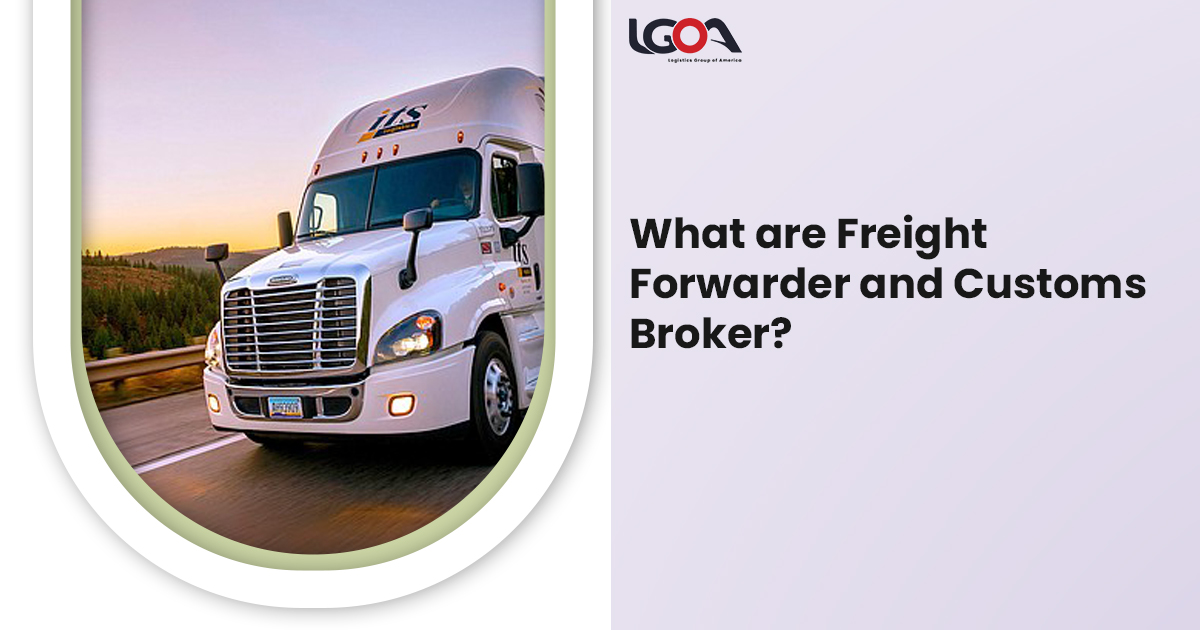As a business owner, you should be well-versed in the logistics of freight shipping. Yes, knowing everything there is to know about a Freight Forwarder and Customs Broker becomes important.
We want to make sure that you have all the information you need before you hire any freight shipping service providers, so learn everything you can about this on the top of your to-do list. Freight Forwarder and Customs Broker are two organizations that play important roles in the supply chain.
Since we have discussed its function in the logistics of export business in this article, as well as how an exporter can select a freight forwarder that is appropriate furthermore for his needs. Additionally, Freight Forwarder and Customs Broker are entirely focused on the actual transportation of cargo.
As a result, the freight forwarder is a broad phrase that can refer to a variety of operations involving numerous third-party entities. Furthermore, these entities involve themselves in the exporting process, such as those who handle or are experts in shipping via truck, boat, plane, or even a mix of these modes.
What is a Freight forwarder?
Freight Forwarder: Firstly, a freight forwarder, in simple terms, is a person who is responsible for the movement of goods on behalf of the shipowner. Secondly, from the time the items are picked up from the seller until they are delivered to the buyer’s selected location, this responsibility can begin.
In addition to this, to move your imported and exported goods all through the world, they team up with you, your suppliers, and transportation providers. Furthermore, importing and exporting are becoming increasingly important components in a company’s success as global business prospects grow.
Therefore, Businesses are increasingly turning to freight forwarders for help with product shipment and delivery.
How can a freight forwarder help you?
Firstly, a freight forwarder is also responsible for gathering and finishing numerous documents as well as ensuring that all specific provisions for export activities are met.
However, it would be more suitable to expound on the fact that there are numerous customs brokers and freight forwarders, all the above it is important to note that customs brokers cannot become freight forwarders.
Customs brokers focus on a special set of services. They’ve learned that an exporter’s freight forwarder can collaborate with them to help resolve complications with an export transaction. As can be seen from the definition, freight forwarding or freight forwarder is a broad term, whereas customs brokers are more focused in terms of service delivery.
What does a freight forwarder do, and what are the advantages of using one?
On your behalf, a freight forwarder coordinates and controls the shipment of products.
They don’t really carry your shipment; instead, they function as a middleman between the supplier, transport carriers, and other logistics companies.
Identifying and booking the most suitable method(s) of transportation for your shipments
- Dealing with carriers to negotiate freight rates;
- Consolidating shipments is a great way to save money.
- Organizing packaging for your items’ safety and safe handling;
- reviewing, preparing, and submitting shipment and export documentation
- Organizing special transportation, such as charters for time-critical or over-dimensional shipments;
- Organizing on-board couriers (hand-carriers) for last-minute deliveries
Who is a Customs Broker?
A customs broker is a certified agent whose major responsibility is to assist importers with the process of clearing goods through clients. Additionally, they can be a private individual, partnership, association, or corporation who acts as a middleman between the importer and the country’s government customs department.
Therefore, Freight Forwarder and Customs Broker act as agents for their clients, filing the necessary information, documents, and payments to customs on their behalf and charging a fee for their services. They must be knowledgeable about entry procedures, acceptability requirements, classification, valuation, and duty rates, as well as any taxes and fees that apply to imported goods.
Customs brokers focus on a special set of services, and they’ve learned that an exporter’s freight forwarder and customs broker can collaborate with them to help resolve complications with an export transaction.
As can be seen from the definition, freight forwarding or freight forwarder is, therefore, a broad term, whereas customs brokers are more focused in terms of service delivery.
On behalf of traders, the scope of tasks expected of a customs broker may vary from client to client and may involve all or any of the following:
- On behalf of traders, prepare documentation connected to release and clear.
- Declarations of files and other data
- Duty and taxes must be paid.
- Refunds and modifications are dealt with.
- Goods accounting and inventory entry
- For licenses, permits, and other requirements, communicate with other government offices.
- Assist with audits after clearance
- Consult/advise traders on how to comply with various regulatory obligations.
LGOA Services:
LGOA (Logistic Group Of America) provides you with the best Freight Forwarders and Customs Brokers, from shipping to customs to storage, we’ve got you covered.
Conclusion:
Freight brokers and Custom brokers are a crucial part of our economy’s backbone, and they help it move forward in a variety of ways. Through this blog, we hope that we were able to give some important information about Freight Forwarder and Customs Broker.

